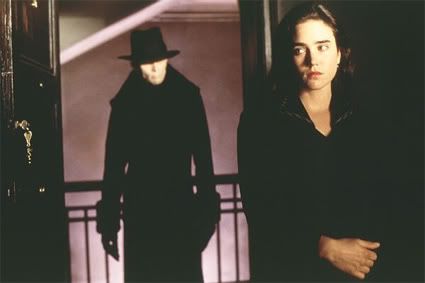
Now that I’ve finally completed the last round of edits for Citizen in the Wilds short of anything that comes from test reads, I can turn my attention to other projects. I have a few on my plate but first and foremost is a deadline approaching with all of the inevitablity of a steam locomotive with a beard in place of its cow-catcher.
The Terribleminds Flash Fiction Challenge.
It needs to be horror and it needs to be set in or about a vacation. That’s about all we have to go on, other than the word count. So how do we begin. What sort of horror do we invoke?
I’ve done the horror thing before and met with moderate success. But I don’t want to rely as much as the supernatural I did in my previous work. Buckets of blood and disgusting monsters doesn’t necessarily make something a horror story. What does, then?
Once again, I direct your attention to the excellent and insightful Extra Credits:
Horror is about human psychology. It’s about understanding those primal fears that have tormented mankind since its early history. Horror is about the irrational and the breakdown of our modern faith in logic and the fundamental order of the world. Horror is about all those things that drive us towards our darker impulses and justify our most bestial actions. Horror is about hopelessness, and facing things so unimaginably greater than ourselves that, for all of our self-importance and assurance of our place in the world, we’re nothing before them.
To me, this is very nearly an outline of the major points a good horror story needs to touch upon to be a true member of that genre. If you rely on jump-out scares or grotesqueness, you’re missing the point. Shock is not the same as horror. Shock fades after a few moments. Horror fucks with your head.
Here’s an example. Villains do things for deeply personal reasons. Those reasons do not necessarily need to be explained to the audience. If you want to make your villain terrifying, regardless of what genre you’re in, keeping their motivations inscrutable even as we get to view their personality can introduce an element of horror into the story. Lay their motivations bare, however, or attempt to obfuscate their drives behind quirky logic or language and you’ll undermine the sentiment of dread you wish to convey. I’m lookin’ at you, Mass Effect.
Give me more examples of true horror as opposed to failures. When have you been shocked, compared to when you’ve been deeply disturbed? These are the sort of things I’ll be contemplating over the next week as I frame this story. I have an idea, and ways to make it interesting, but making sure it fits into the horror genre as a whole instead of just playing with the occasional scare will be the real challenge.



October 6, 2010 at 11:42 am
I like the description of horror, though I’m of two minds about what makes for a good horror story. Yes, truly disturbing horror messes with one’s head; but classic horror, stuff that people love and share, is FUN. “The irrational and the breakdown of our modern faith in logic and the fundamental order of the world” is liberating and exhilarating. Face it, baby, we WANT monsters to be real, because deep down, we do believe in them, no matter how we attempt to convince ourselves otherwise.
So I’d say that there’s shock, there’s disturbing, and there’s fun. Shutter Island was disturbing. Heck, anything with parents losing children is disturbing. (That is, after all, our greatest fear and most anguishing powerlessness. Stephen King returns to that well ALL THE TIME.) Saw and Hostel are just shock, which is crap. “Oo, look what I can do with latex.” Please. But fun horror? Drag Me to Hell, Trick ‘R Treat, Pumpkinhead, Ginger Snaps, Friday the 13th… the list goes on and on. And I’ve got to tell you, for FUN horror, the supernatural is a must. What’s more illogical than that? 😉